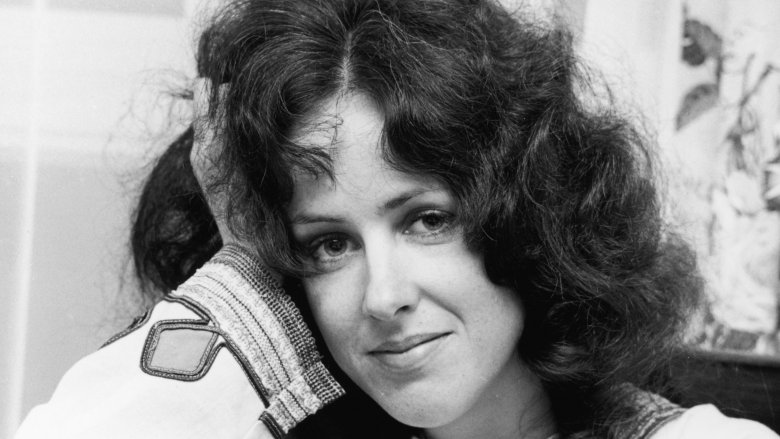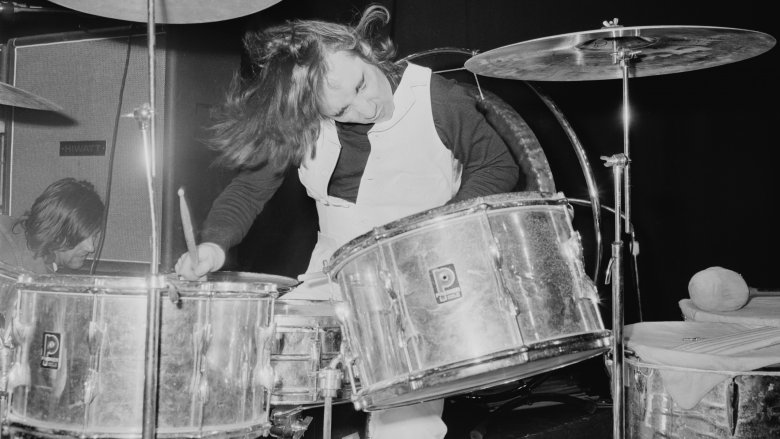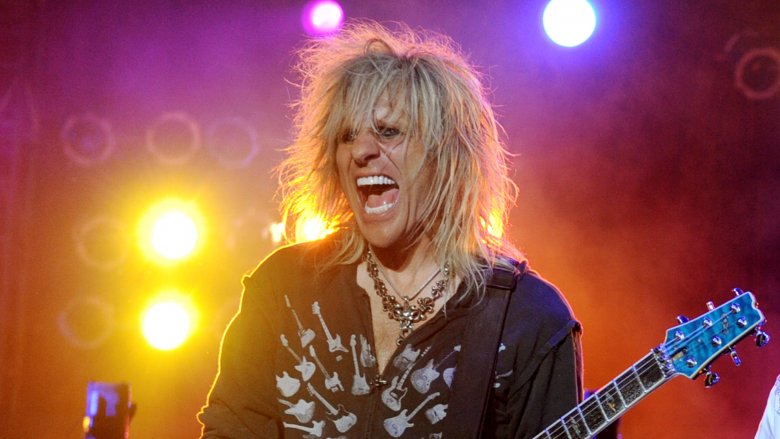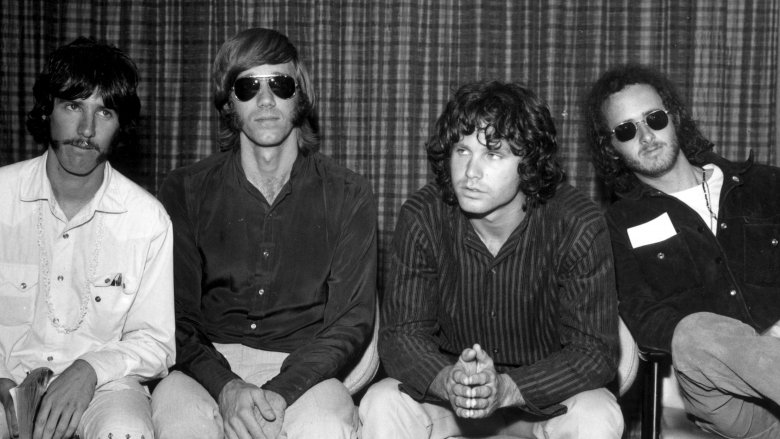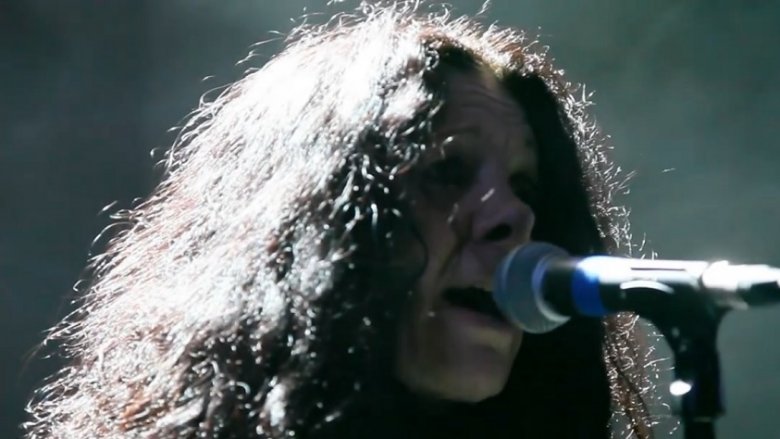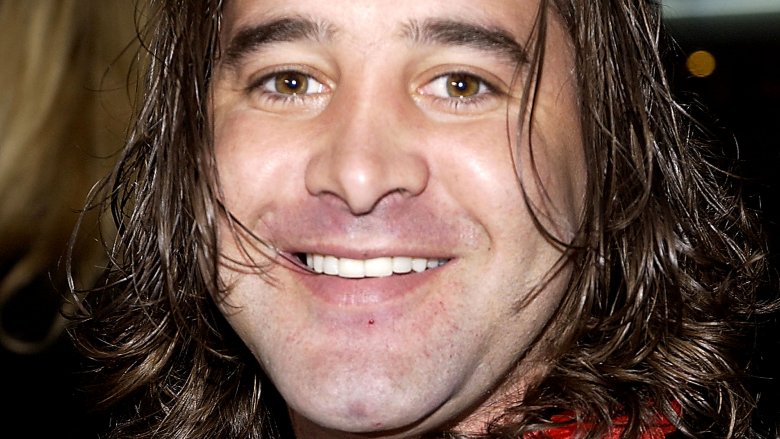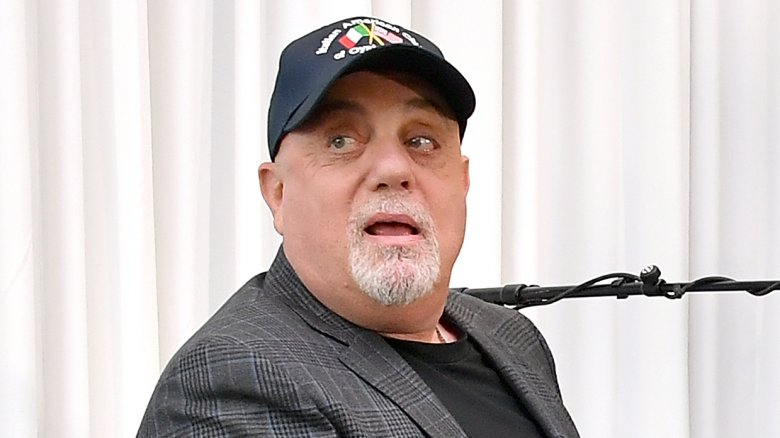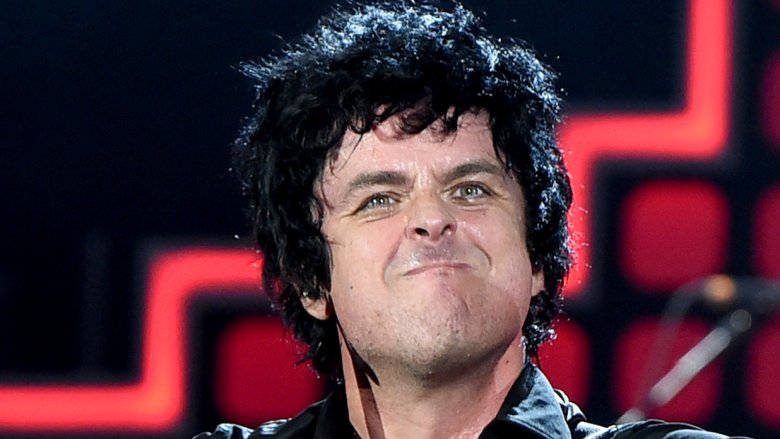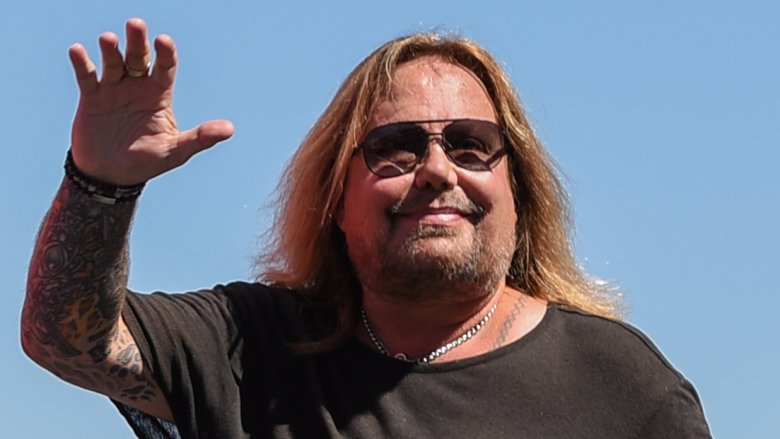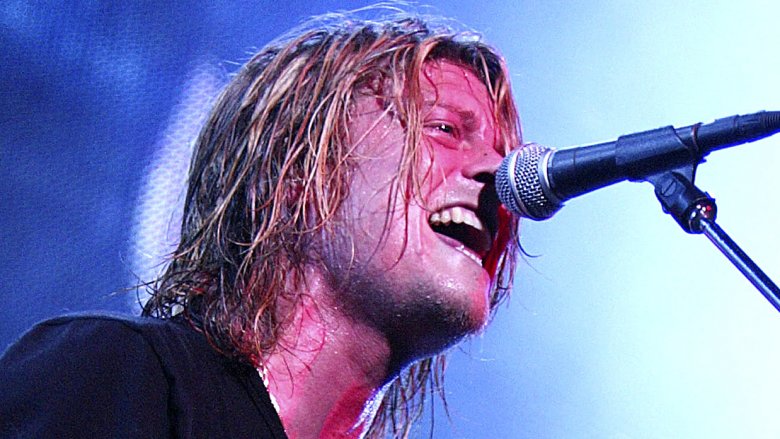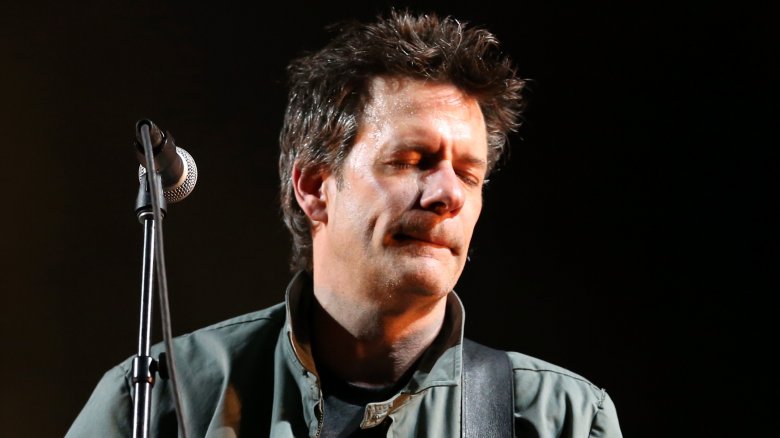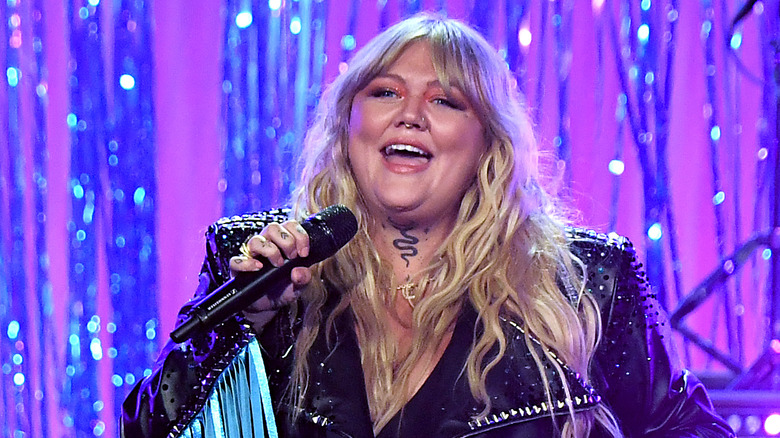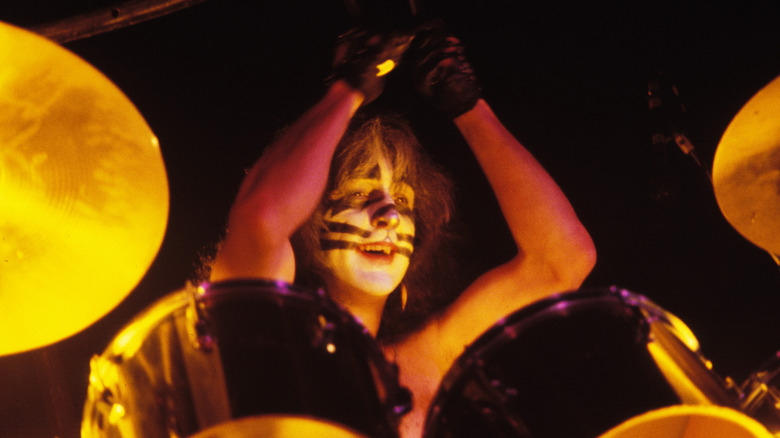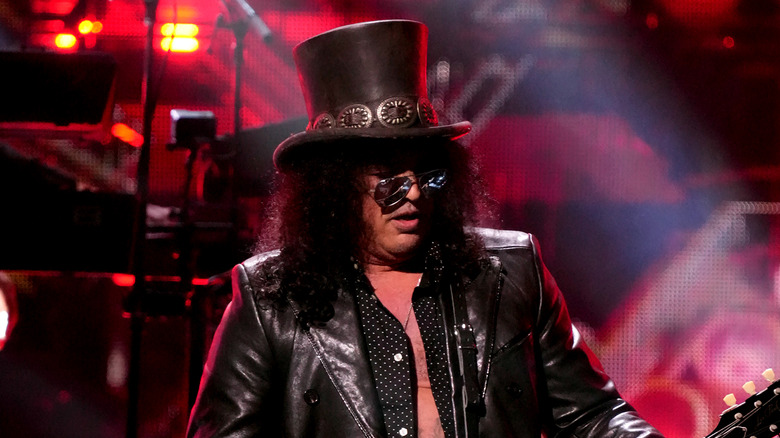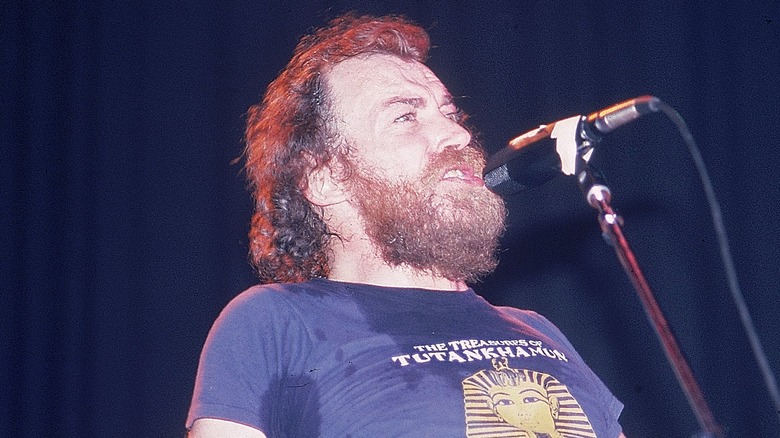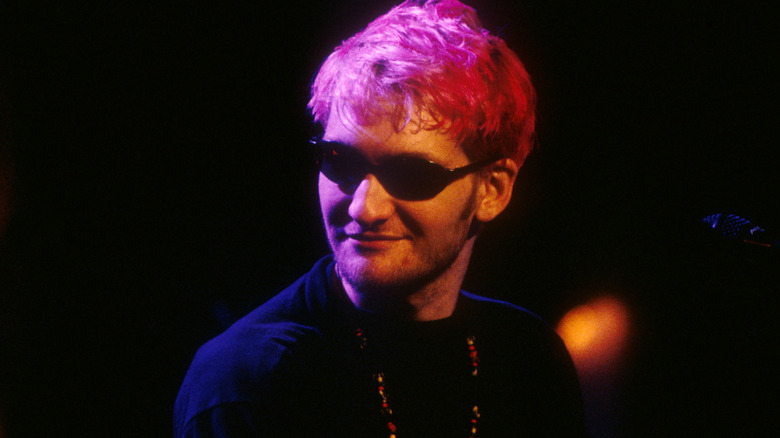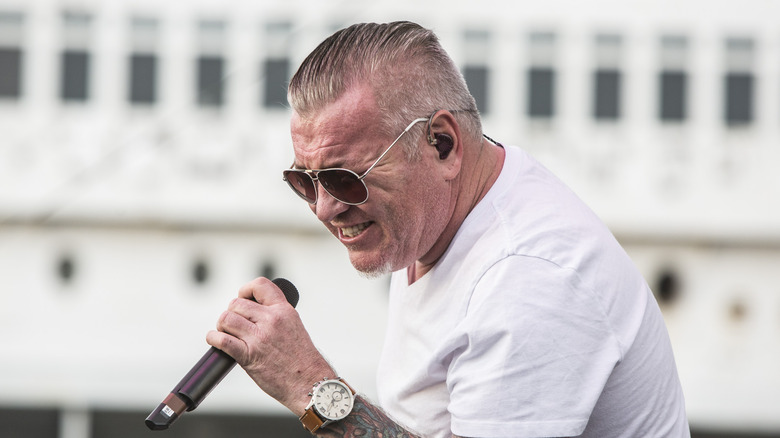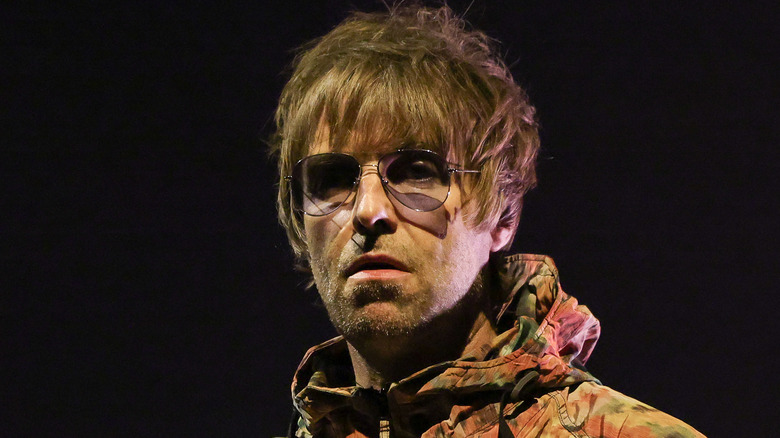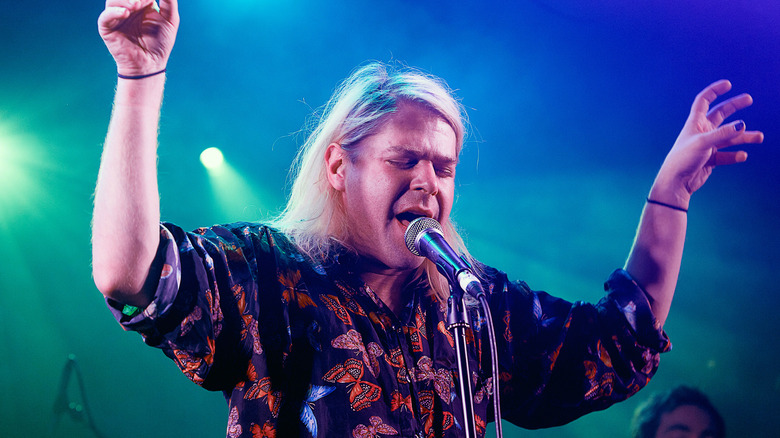Times Musicians Were Too Wasted To Perform Live
If you've ever woken up the morning after having gotten way too drunk the night before, you know it can be pretty mortifying. You're unsure if you're remembering anything right, and you kind of hope you're not, because the flashes of memory you are able to drag up from the depths of your throbbing brain are supremely embarrassing. You're pretty sure you got in a fistfight with a clown, and all the notifications on your phone suggest that you'll probably never be invited to another bar mitzvah again. But if you happen to be a famous musician, the experience is made much worse.
For one, there's the fact that any half-remembered drunken antics take place in front of thousands of people who paid good money to see you not make a jackass of yourself. It's one thing to be so toasty that you throw a bum note or flub a lyric here and there, and most fans are well aware of those rock bands with the worst drama, but these entertainers showed up to their gigs utterly ker-hammered — and hilarity or extreme awkwardness ensued.
The following article includes allegations and descriptions of addiction and domestic abuse.
Grace Slick
In 1978, the band formerly known as Jefferson Airplane had become Jefferson Starship, and vocalist Grace Slick was certainly spending her share of time in space. She was known to enjoy a cocktail or 14, usually having no problem holding it together. But during a tour of Europe in support of their album "Earth," the band decided to make a few stops in Germany. This was a questionable decision, because — as author Jeff Tamarkin remarked in the band's biography "Got a Revolution!" (Via Ultimate Classic Rock) — Slick "always had a thing about Germany. ... All things Deutsche brought out the worst in her."
Slick warmed up by drinking literally all the alcohol she could get her hands on, throwing a giant tantrum, and refusing to get ready for the show. By the time she was dragged onstage, she was so well-lubricated that she decided she'd rather berate the locals than sing, mockingly asking them "Who won the war?" while slinging around very specific references to WWII-era Germany and performing the accompanying salutes. Starship publicist Cynthia Bowman called it a "horrible, empty, bad, dark night," and it resulted in another tragic event in Slick's life with her dismissal from the band. She rejoined several years later in time to participate in "We Built This City," which some think might be the worst song ever, proving that you don't need alcohol to make terrible decisions.
Keith Moon
If you're unfamiliar with The Who's legendary, late-drummer Keith Moon, you really only need to know two things: He ruled the drums, and he embodied pure debauchery. This is a man who drove a car into a motel swimming pool — possibly while naked — at his own birthday party, and Moon once drunkenly killed his chauffeur in a tragic car accident. His appetite for drugs and drink was considered to be completely insane even by other rock stars, yet he could still play hours-long sets looking like a tornado made of drumsticks and sweat.
That is, until a San Francisco gig in November 1973. Moon had taken some of what he assumed were run-of-the-mill tranquilizers to calm his nerves, chasing them with brandy, but they may instead have been horse tranquilizers. In the middle of performing "Won't Get Fooled Again," Moon began to wind down like a cheap clock. He was dragged off stage and thrown in a cold shower (or injected with cortisone, depending on whom you ask) and brought back out to attempt "Magic Bus" — only to wind down yet again, actually passing out on his kit. In a last-ditch effort to finish the show, guitarist Pete Townsend asked if anyone could play drums — leading 19-year-old fan Scott Halpin to join his favorite band onstage for the last few songs. Halpin performed admirably, considering the insane pressure and the contact high he must have gotten just from sitting behind Moon's drum kit.
David Lee Roth
Van Halen was as hard-drinking as any '80s hard rock band, and consummate front man and cartoon-come-to-life David Lee Roth was no exception. The band was tapped to headline "Rock Day" at the 1983 U.S. Festival, a ginormous days-long event that was the brainchild of then-32-year-old Apple co-founder Steve Wozniak. The band showed up to the festival in pretty ragged shape after having spent the previous three months touring. Roth gave a sign of things to come by giving a loud, incoherent interview to MTV VJ Mark Goodman, who described Roth as "drunk and coked up, laughing at every joke he made" (via Rolling Stone) before their set. Then the band took the stage (after making the audience wait for three hours), and the real fun began.
Roth promptly began forgetting half the lyrics to the songs he was supposed to be singing, and what words he could remember didn't seem to be coming out quite right. Wozniak wrote in his memoir that Roth was "practically falling down onstage. He was so drunk, slurring and forgetting lyrics and everything." He then proceeded to make things better by talking smack about the Clash, who were also present at the festival and already annoyed with the band for remarks Eddie Van Halen had made to Rolling Stone questioning their musical chops. The sloppy set ended in a backstage altercation, Steve Wozniak paid everybody too much and lost millions, and Roth probably forgot the whole thing ever happened.
Eddie Van Halen
Van Halen's David Lee Roth was eventually replaced by Sammy Hagar, an established vocalist with several hits under his belt. The move divided fans at the time, but Hagar acquitted himself well within the band, especially considering the fact that Hagar's relationship with Eddie Van Halen wasn't always rosy. Even though Hagar's tenure was Van Halen's most commercially successful period, he was dismissed from the band in 1996. When he rejoined them for a reunion tour eight years later, he almost immediately wished he hadn't. In an interview with journalist Sally Steele in 2012, Hagar called his experience on the 2004 reunion tour "some of the most miserable, back-stabbing dark crap I've ever been involved with my whole life."
Hagar tried to quit the tour at least once, but stayed under threat of getting sued, which every musician knows is an ideal situation for maximum rocking. Hagar barely spoke to Eddie for the entire tour, and on the final night, things really came unglued. In his memoir "Red: My Uncensored Life in Rock" (via Ultimate Classic Rock) Hagar recounted that "It was the worst show we'd ever done in our lives. Eddie played so bad." In the middle of a song, a visibly inebriated Eddie smashed his guitar to bits (sending guitar shrapnel flying into the crowd), tearfully shouted "You don't understand!" to the crowd, and stalked off the stage, emphatically ending his relationship with Hagar.
C.C. Deville
Poison was one of the more respectable bands to work in the genre that is commonly known as "hair metal," with their supremely catchy tunes and wild stage antics earning them legions of spandex-clad, freaky-haired fans. Guitarist C.C. DeVille was a guy who knew how to put on a show — except during the 1991 MTV Video Music Awards, when he forgot how to put on a show, which song he was supposed to play, how to play his instrument, and presumably his name, all because of his serious cocaine misuse issue.
The infamous performance started poorly and only got worse. First, DeVille launched into the band's hit "Unskinny Bop," the song they were supposed to play, during a commercial break. After lurching through the song for a couple minutes, DeVille seemed to realize he'd screwed up and just petered out, apparently waiting for host Arsenio Hall to tell him what to do. He then launched into the ironically titled "Let It Play," which he was actually not supposed to play. For some reason, lead singer Bret Michaels confused DeVille further by prompting him to play the band's other hit, "Talk Dirty To Me." So DeVille played it extremely poorly, even taking several seconds to notice when his guitar came completely unplugged. Michaels played it off afterward by proclaiming, "It ain't perfect, but it's rock and roll" (via Ultimate Classic Rock). Then he followed DeVille backstage and fired the hell out of him.
Jim Morrison
It might not surprise anybody that Doors front man Jim Morrison has earned his place on this list several times over. His booze-soaked stage shenanigans are well-documented, but two incidents stand out as particularly egregious. During a European tour in 1968, the band was playing a gig in Amsterdam with Jefferson Airplane, which may not have been a great idea. After doing approximately all of the drugs and drinking half the booze (saving the rest for Grace Slick), Morrison took the stage — during Jefferson Airplane's set, dancing around for a little while before collapsing into a pile and going nighty-night right there. As Morrison was carted off to the hospital, the show went on, with keyboardist Ray Manzarek taking over on vocals for the duration of the set.
Unfortunately, things sometimes got worse when Morrison stayed conscious long enough to attempt to perform. At a 1970 show in New Orleans, he mixed up his words, failed to sing entire verses, and used a mic stand for support throughout the set before finally just having a seat on a drum riser. When drummer John Densmore prodded Morrison with his foot, the Lizard King got up, grabbed the mic stand, smashed it to bits, and walked offstage. It was the last show he would ever play with the Doors, who at this point quite sensibly decided to just stop playing live.
Amy Winehouse
Amy Winehouse famously had a massive hit song about not wanting to go to rehab, and tragically joined the long list of stars in the notorious "27 Club" after predicting that she would do so, according to friend Alex Foden (via DNA). During what would have been her comeback tour shortly before her death, Winehouse had infuriated fans by showing up to a gig in Belgrade, Serbia, utterly plastered, despite the fact that she was ostensibly banned from drinking on the tour. According to The Telegraph, Winehouse kicked off the night by greeting the crowd with, "Hello, Athens" (which is not a city in Serbia) before launching into a mumbling, incoherent set, alternately falling over, sitting down, and wandering offstage.
The 20,000 or so in attendance, many of whom had paid ridiculous amounts of money for tickets, were not amused. Co-headliner Moby would later tell The Hollywood Reporter that as he was approaching the venue, he could "hear the audience booing louder than the music" and that he'd arrived to find what remained of the crowd "looking on in disbelief" as the band played awkwardly. It would sadly be Winehouse's final performance before her tragic death in 2011.
Gene Ween
Ween is a band that could fairly be described as idiosyncratic. Front man Gene Ween (real name Aaron Freeman) has been known to imbibe a bit before some of the band's more intimate shows, but the 3,000 fans who paid $50 per ticket for a 2011 gig in Vancouver were none too pleased to find that Freeman was phoning in his performance from some distant planet.
Freeman spent the opening instrumental number trying desperately to remember how to work a tambourine while the rest of the band nailed every note. When it came time for him to rock the mic, it got so much worse. Freeman sang his lyrics in a bizarre, off-kilter voice for the first few tunes, but he was at least singing. After guitarist Dean Ween (Mickey Melchiondo) took over on vocals for a few songs, Freeman completely botched the lyrics to the next number, had a seat onstage for the one after that, and was flat on his back by the next one. Springing up to apologize, he then totally ruined the Alarm's classic "Spirit of '76" with his off-key vocal before deciding it was time to totally fail at tuning his guitar. At this point, everyone else onstage literally left. Freeman took a while to notice, flubbing his way through one more tune before forlornly asking, "Hey, where's the band?" (via the Georgia Straight) and mercifully departing the stage.
Johnette Napolitano
Concrete Blonde was an indie band best known for '90s hits like "Joey" and "Tomorrow Wendy," and singer Johnette Napolitano, with her distinctly huge, awesome voice, was a big part of the band's success. Fans attending a 2016 solo gig in Fort Worth, Texas, expected to hear some of the powerhouse singer's signature belting, but instead got treated to an insanely awkward mumble-fest by a performer who had clearly had six or seven belts of liquor too many.
Napolitano kicked off the festivities by obnoxiously crashing the stage during the opener's set, then opened her own set by apparently forgetting how to sing or play "Joey." According to the Dallas Observer, one audience member said, "She trailed off and was mixing up the lyrics and adding things in. ... It was like she couldn't remember the song at all and was just pawing at the guitar." The audience ended up singing most of the song for her, and halfway through the next number Napolitano rose from her stool, grabbed the mic stand, and just biffed it, right onstage. The curtain came down 10 minutes after Napolitano had taken the stage, with the singer barely conscious and flat on her back, and angry fans were told they couldn't even have a refund because she had technically shown up.
Scott Stapp
Creed front man Scott Stapp may be sober these days, but in years past, he was known to arrive at gigs looking like he had fallen into a pool of booze and had to drink his way out. One of the band's shows in Chicago in 2002 is legendary for all the wrong reasons, and may even be one of the worst performances ever given by a major band in the modern era. It was so bad that a group of fans actually filed a lawsuit against the band for cheating them out of a real show.
According to MTV News, the court filing stated that Stapp was so "intoxicated and/or medicated that he was unable to sing the lyrics of a single Creed song," and that he "left the stage on several occasions during songs for long periods of time, rolled around on the floor of the stage in apparent pain or distress, and appeared to pass out while onstage during the performance." The band actually carried on for the entire show, playing extended solos and generally just trying to pretend that everything was fine. While the lawsuit was eventually thrown out, the debacle was the beginning of the end for Creed, which broke up in 2004.
Billy Joel
Elton John and Billy Joel hit the road together in 2002 and took their piano-fueled show to Madison Square Garden in New York City. First they played a few songs together, but then Joel left the stage, leaving John and his backing band to grow some funk of their own. Then it was time for the Joel portion of the evening, although fans had been forewarned to not expect the "Piano Man" at his "My Life"-growling or "Just the Way You Are"-crooning best, as they'd been told Joel had a cold. But that couldn't explain Joel's behavior. Sure, he sang, but then he went off on a weird rant where he made fun of the Liberty Bell for having a crack in it, before yelling out the names of major World War II battles. "Corregidor! Midway! Guadalcanal!" Joel screamed.
The music eventually continued, although Joel was clearly compromised. "When he slumped forward on his bench and slurred, ”Don't, don't, don't try to save me,” he sounded truly hopeless," Kelefa Sanneh wrote in The New York Times. "As he wailed he banged on his keys almost at random." When John returned for a double-piano presentation of "Bennie and the Jets," Joel banged on the keys nonsensically, and John visibly mouthed the words "Thank God" at its conclusion. It's not for nothing that in June 2002, Joel entered a rehab facility.
Billie Joe Armstrong
Green Day may have reached commercial heights with power ballads like "Boulevard of Broken Dreams," but deep down, they're still a band of punks. And a real punk will act like a brat, drop some f-bombs, and break some stuff when they feel like it. Billie Joe Armstrong and company played the iHeartRadio Festival in Las Vegas in September 2012, and while the band played its 1994 hit "Basket Case," a message flashed up on a monitor informing Armstrong that he had just one minute left of stage time. (Radio station festivals are often overloaded with acts and offer notoriously short time slots.)
That awakened a righteous fury deep inside Armstrong, who cut "Basket Case" short to deliver a remarkably profane rant to a bewildered crowd. "You're gonna give me f***ing one minute? Look at that f***ing sign right there. One minute!" Armstrong bellowed. "I've been around since f***ing nineteen-eighty-f***ing-eight. And you're gonna give me one f***ing minute? You gotta be f***ing kidding me!" Armstrong then declared that he wasn't "Justin Bieber" and decided to show organizers what he could do with his "one f***ing minute": He smashed his guitar, flipped the bird, and stormed off the stage. Armstrong, who was extremely intoxicated when he went out onstage that night, soon thereafter entered rehab.
Vince Neil
As laid out in graphic, extreme detail in Motley Crüe's memoir "The Dirt" and its film adaptation, the '80s hard rock band fueled its music with substances. Lead singer Vince Neil drank profuse amounts of alcohol up until one night in 1984, when he crashed a car while driving drunk, killing his passenger, Hanoi Rocks drummer Razzle. Neil checked into a rehab facility but sobriety remained a challenge, with him seeking further professional help more than once. In June 2006, Neil was off the wagon when he took the stage for a solo show in Tampa, Florida. According to an eyewitness account published by Blabbermouth, Neil was already "smashed" when his set started. He couldn't seem to remember the words to any of his songs and stumbled around the stage, almost falling down. When the crowd started to boo, Neil yelled at them to shut up and went backstage. His band carried on, turning out some Led Zeppelin covers before bringing out singer John Corabi of opening act Ratt (and briefly Neil's replacement in Motley Crüe). Neil followed him out, and together they sang Motley Crüe's "Live Wire" before Corabi disappeared, allowing Neil to lurch around the stage for a few more minutes.
A few days after the fact, Neil told the Calgary Sun (via Blabbermouth) what had happened. "I was pretty buzzed. I tripped, fell off [the stage] — sometimes it happens."
Wes Scantlin
After playing just four songs at Headliners, a club in Toledo, Ohio, all the members of Puddle of Mudd who were not front man Wes Scantlin walked off the stage. And the reason? Scantlin, by his own admission, was "too f***ed up" to perform. Not taking the hint from his bandmates, the singer and guitarist remained on stage, and for an agonizing and bizarre half hour, he staggered around, swore profusely, insulted the audience, dodged stuff thrown at him by the hostile crowd, dropped his guitar, and sang unrecognizable songs. Finally and mercifully, Scantlin threw in the towel and headed to his dressing room backstage. Apparently his show was so drunken and terrible that Toledo police arrested Scantlin on a misdemeanor count of disorderly conduct. He was released after paying a $150 bond.
A few days later, Scantlin explained himself. "I just got a little too buzzed to play my guitar and sing at the same time," he told MTV News (via Blabbermouth). "Out of playing over 400 shows in the last four years of my life, one of them kind of didn't go very well and I had a bad day."
The Replacements
The Replacements are alternative rock legends from back in the days when they called it "college rock" — in other words, the '80s. Shortly after the release of its major label debut, "Tim," the band made its national television debut on the January 18, 1986, episode of "Saturday Night Live." According to Bob Mehr's "Trouble Boys: The True Story of the Replacements" (via Rolling Stone), the band's pre-show ritual of getting wasted was in jeopardy when they found themselves stuck on SNL's "dry" set after soundcheck. But their sound guy snuck in a bunch of booze, which the musicians gulped down in their dressing room.
Just after midnight, the intoxicated Replacements took the stage to play "Bastards of Young." Lead singer Paul Westerberg wandered away from his mic mid-verse, while bassist Tommy Stinson staggered around so much he rarely wound up in frame. Westerberg, worried that guitarist Bob Stinson would come in late on his solo, shouted "Come on, f***er" as a cue, which a mic picked up and the censors missed. At the end of the song, Bob Stinson did a somersault, unaware that his outfit had torn, adding a brief glimpse of backside to the circus.
That drunken behavior, along with a post-show drunken destruction of their hotel room — for which a bill was sent to Lorne Michaels — earned the band a lifetime ban from "SNL," although Westerberg did come back to "Saturday Night Live" as a solo act in 1993. (He behaved himself.)
Elle King
In January 2024, the Grand Ole Opry celebrated the 78th birthday of one of the institution's members, Dolly Parton, with an all-star concert tribute at the Ryman Auditorium in Nashville. A sequence of well-known stars showed up to perform some of Parton's biggest hits, and Elle King, a pop and blues singer turned country performer, was assigned "Marry Me." King didn't exactly deliver the tune, however, muttering admittedly nonsensical and made-up lyrics throughout. "I don't know the lyrics to these things in this f***ing town. Don't tell Dolly 'cause it's her birthday," King uttered (via People). "Everyone's like, holy s***, we bought tickets to this s***. I'm not even going to lie," King said when she was done. "Y'all bought tickets for this s***?" Then she told angry, vocal audience members that they would not be issued refunds on their tickets.
The Grand Ole Opry responded to dissatisfied attendees on X, formerly known as Twitter: "We deeply regret and apologize for the language that was used." Four months later, King admitted on Chelsea Handler's "Dear Chelsea" podcast that she'd been drunk during the performance, and that she'd sent letters of apology to both Parton and the Opry. "I take one shot too many and I'm just not there in my body. I'm not there. I don't remember it," King said (via People).
Ingrid Andress
Country singer Ingrid Andress crossed over to the pop chart in 2019, and after ascending to fame in those two disparate worlds, she was given a fairly prestigious opportunity. Andress sang the National Anthem before the Home Run Derby, one of the biggest tertiary events associated with the 2024 Major League Baseball All-Star Game. A video of the performance became a viral hit, amassing more than seven million views, not for the patriotic fervor or musical mastery conveyed by the singer, but because Andress did it while very intoxicated. She played around with notes, moved up and down the scale, and added so many stylistic choices that the familiar and beloved National Anthem fell into an off-key musical purgatory.
The next day, Andress apologized and explained on Instagram. "I'm not gonna bulls*** y'all, I was drunk last night," the singer wrote. "I'm checking myself into a facility today to get the help I need. That was not me last night. I apologize to MLB, all the fans, and this country I love so much for that rendition."
Scott Weiland
One of the biggest alternative rock bands of the 1990s, Stone Temple Pilots split up in 2003 for its members to pursue other projects. Everyone reconvened in 2008, and they hit the road in 2010 in support of a self-titled comeback album.
Throughout the band's history, lead singer Scott Weiland coped with substance abuse, submitting to rehabilitation programs at least 12 times. During a September 2010 Stone Temple Pilots concert in Houston (that started an hour later than it was supposed to), Weiland gave the assembled fans some ostensibly good news. "On the eighth of December will be the time when I stopped doing dope," Weiland declared, although with a caveat and noticeable slurring. "I started drinking again." He then delivered some remarks about a recent painful divorce and the need for self-care. Just after the show, Stone Temple Pilots said it would reschedule its next 10 concerts.
Peter Criss
In the late 1970s, shows from the theatrical hard rock band Kiss would take a break from the fire-breathing, blood-spewing, and pyrotechnics for a quiet, heartfelt moment. The band's biggest actual hit was the uncharacteristic orchestral ballad "Beth," co-written and sung by drummer Peter Criss. Each concert, the rest of Kiss would leave the stage, and Criss would sit on a stool and croon the sad tune.
"Beth" constituted Criss's big moment, and the only song he ever had to sing. At a 1979 tour stop in Largo, Maryland, he veered off the beat several times with his vocals as well as when he attempted to clap along to the song. Criss also couldn't seem to consistently remain in one key, swayed wildly on his stool when he performed, and couldn't remember the lyrics a couple of times. Getting up off the stool to amble around his spotlit area didn't seem to help.
Not long after the incident, in 1980, Peter Criss's substance abuse had grown so unmanageable, and had so negatively impacted his musical work, that the rest of Kiss kicked him out of the band.
Slash
Guns N' Roses was at the height of its commercial powers in 1991, releasing two "Use Your Illusion" albums simultaneously and embarking on a two-year-long world tour to promote those records. The band's popularity had made its virtuosic lead guitarist Slash one of the most admired musicians in rock, but he also liked to drink heavily both in his personal time and during shows. At a 1991 concert in New York City, Slash was so intoxicated that he couldn't correctly play "Welcome to the Jungle," a song from Guns N' Roses' 1987 debut album "Appetite for Destruction."
Slash bungled the introduction to the song and played it in the incorrect key, probably a symptom of drunkenness. It became increasingly evident that Slash was drunk when he brought the concert to a halt to deliver a profanity-filled rant to address why he'd removed all of his clothing except for his underwear. "I had to change my f***ing clothes, cause the pants I was wearing f***ing broke and my b*** were hanging out," he explained.
Joe Cocker
In the 1960s, British blues-rock singer Joe Cocker interpreted the songs of others (most famously the Beatles' "With a Little Help from My Friends") with such soul and passion that it manifested on stage as erratic movements and undulations. The public interpreted such actions as those of an intoxicated individual, and that was in part a correct assessment because Cocker dealt with addictions to drugs and alcohol throughout the 1970s.
He managed to find sobriety by the early 1980s, but not after a disastrous June 1974 concert that was supposed to launch a career comeback following four years of very little musical output. The one-night-only show in front of his supporters at Los Angeles' Roxy Theater was a mess. "Mr. Cocker embarrassed and saddened his closest friends in the music business with a rambling, incoherent fiasco," John Rockwell of The New York Times wrote. Cocker had evidently consumed so much alcohol before the concert that he vomited during the show, demonstrated trouble remembering the lyrics to his best-known songs, had difficulty delivering other lines, and then took a seat on the stage and made a point of not singing "With a Little Help from My Friends."
Layne Staley
A staple of 1990s music television, "MTV Unplugged" presented major artists of the era and had them perform their songs without the aid of electric instruments. In 1996, the series' first run wrapped up and included an episode featuring one of the decade's most influential acts: Seattle-based grunge band Alice in Chains.
Lead singer Layne Staley dealt with a persistent addiction to heroin, and he sought out treatment several times in the early 1990s. During the taping of "MTV Unplugged," "Sludge Factory," a track from the band's then-recent self-titled 1995 album, proved too tough for Staley to navigate because he was so intoxicated. "Funny story, we did the 'Unplugged' in New York and Layne kept f***ing up 'Sludge Factory,'" Alice in Chains guitarist Jerry Cantrell said during a 2018 solo show (via Alternative Nation). "We did it like eight times, he blew the same thing in the second verse." The take that made it to the aired version wasn't perfect either — Staley can be heard muttering the F-word at a troublesome section.
Steve Harwell
Once a powerhouse of late-'90s, laid-back pop rock, Smash Mouth scored many hits, like "Walkin' on the Sun" and "All Star." By the 2020s, Smash Mouth was a nostalgia act that played smaller venues and events, such as The Big Sip at Bethel Woods, a 2021 beer and wine festival in upstate New York. Attendees noted how throughout his band's set, Smash Mouth singer Steve Harwell appeared unsteady on his feet and garbled his words. Equipment malfunctions agitated Harwell, who took out his frustrations on the audience. "I'll f***ing kill your whole family, I swear," Harwell said at one point (via the New York Post), along with "F*** you, b****es!"
Harwell was in the midst of dealing with substance abuse issues, which exacerbated serious health concerns. In 2013, he'd received a cardiomyopathy diagnosis, a heart ailment with far-reaching ramifications like loss of memory and the ability to speak. After the concert, Smash Mouth announced that Harwell would take a break from the band, and then the singer announced his retirement from performing.
Liam Gallagher
In July 2000, Oasis played two nights at London's massive Wembley Stadium. The band was on the verge of collapse due to two longtime members' recent departures, a break from its label, poor reviews and sales for its album "Standing on the Shoulders of Giants," and lead singer Liam Gallagher being distraught over a divorce and creative tensions with his brother and fellow Oasis member Noel Gallagher.
Liam Gallagher was apparently intoxicated for most of the first show. After stumbling onto the stage to give a hug to the lead singer of opening act Happy Mondays, Gallagher muttered profanities while singing and during breaks, while also trying to intimidate his brother and badmouthing his estranged wife. He changed lyrics at will, and at one point, refused to sing another line unless some women in the audience removed their shirts. At the end of the concert, he wouldn't leave the stage, even after the rest of Oasis had departed. He told the audience, "I'll go if you go. You go first." Gallagher admitted later that he used to habitually drink during concerts — but not after the 2000 Oasis shows at Wembley.
Ariel Pink
In October 2017, indie rocker Ariel Pink began a four-show residency at The Chapel in San Francisco. Visibly intoxicated when he took the stage, with the assistance of opening act John Maus, the show included a few acts of violence from the singer perpetuated against his bandmate and romantic partner Charlotte Ercoli. "He kept grabbing her like a piece of meat, grabbed her ankle and wouldn't let her go, attempting to push her into the crowd which she was clearly uncomfortable with," an attendee related on Reddit. "He literally pinned her down to the stage and got on top of her in a very assault-y fashion."
Days later, after news of what transpired at the concert spread, Pink addressed the matter on X, formerly known as Twitter. "I got very drunk and overdid everything and wrecked my vocal chords and managed offend [sic] with my antics," the musician said (via Pitchfork). "Sometimes I alienate when I should aim to inspire. I'm tone deaf and not sensitive enough to the real plight of women these days. my behavior onstage was gross and I can't defend it."
If you or anyone you know needs help with addiction issues, may be the victim of child abuse, or has experienced a hate crime, contact the relevant resources below:
-
The Substance Abuse and Mental Health Services Administration website or contact SAMHSA's National Helpline at 1-800-662-HELP (4357).
Advertisement -
The National Domestic Violence Hotline at 1−800−799−7233. You can also find more information, resources, and support at their website.
